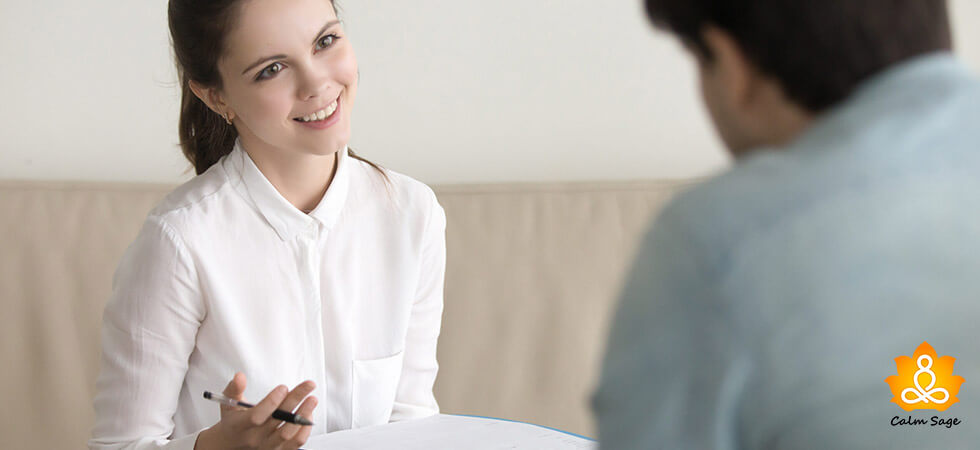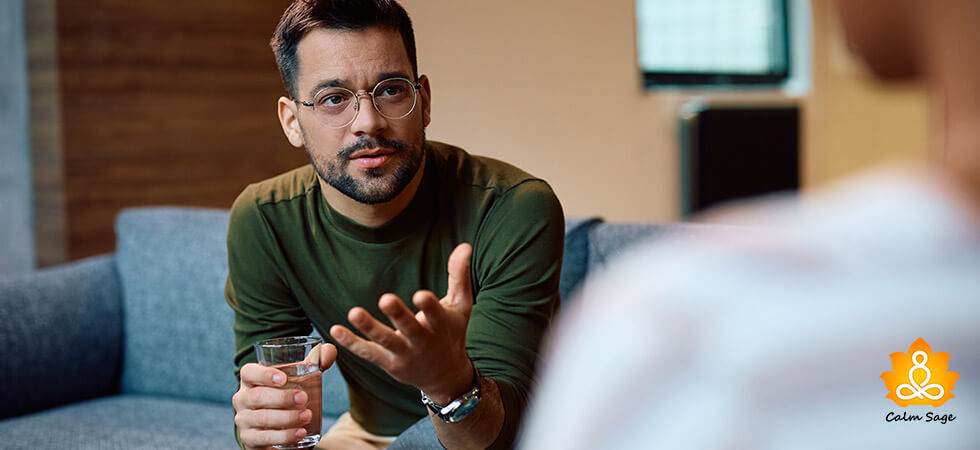Recreational Therapy Guide: Everything You Need to Know About It
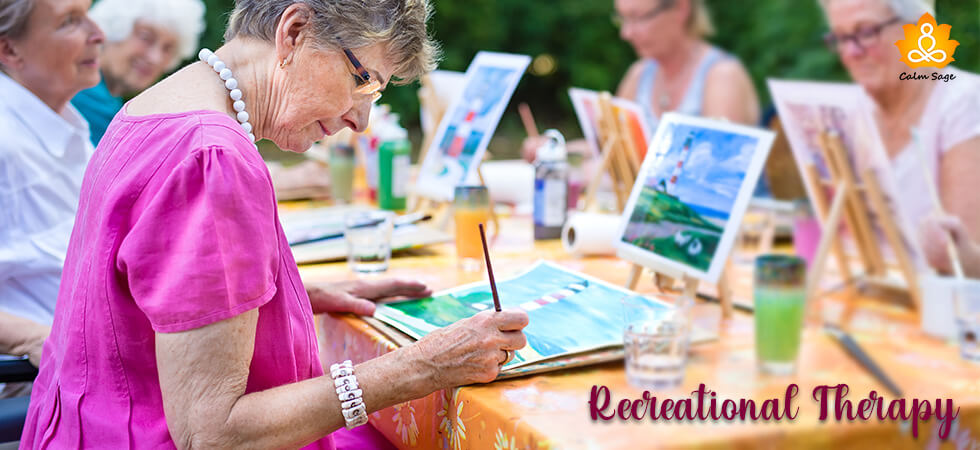
Do you often sit on your own with feelings of being overwhelmed hovering over you? At that moment don’t you just feel like giving yourself a dose of happiness hormones by moving your body?
After all, we do know that engaging in a leisure activity is sure to uplift our mood. But did you know that apart from providing immediate relief to our current problems, recreational activities can change your life completely when experienced in the form of therapy?
That is Where Recreational Therapy Comes into Play!
Yes, you heard it right Recreational Therapy is a therapeutic intervention primarily focused on restoring, remediating, and enhancing your well-being with the help of recreational activities. Want to know more about recreational therapy or therapeutic recreation?
Let us dive a little deep to understand this systematic process in detail.
What Is Recreational Therapy?

Of course, we can’t move any further without first understanding the definition of recreation activities. It is a therapeutic process that purposefully utilizes leisure activities in a way that maximizes a person’s overall well-being on one end and minimizes the chances of illness on the other.
The famous recreational therapist Michael Coluccio define recreational therapy as,
“Recreational therapy, also known as therapeutic recreation, is a therapy based on engagement in recreational activities (e.g. sports or music) especially to enhance the function, independence, and well-being of individuals affected with a disabling condition. The savvy recreation therapist will utilize multiple “domains” for stimulation and success in implementation with the client.”
The fact that recreational therapists customize the therapy program for each individual to meet his needs makes this therapy even special. This further ensures that the client’s rehabilitation and treatment plan offers the best results to them.
The ultimate aim of recreational therapists is to reduce signs of anxiety, stress, depression, and any other physical ailment of a person by aiding in building social relationships and confidence.
5 Domains of Recreational Therapy
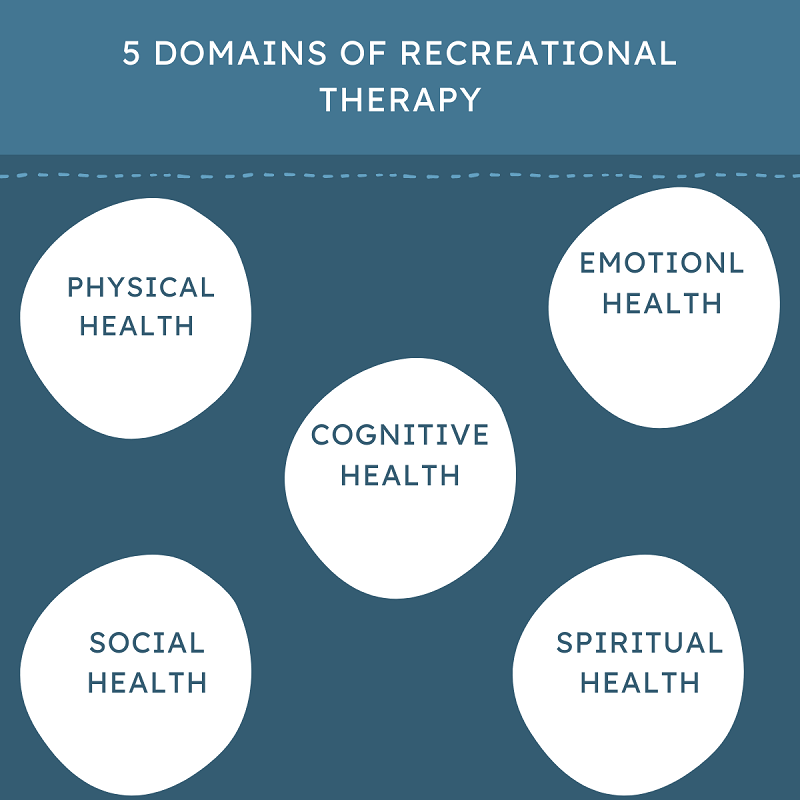
If you read Coluccio’s definition of recreational therapy closely you see that he has mentioned multiple domains. These domains are at the heart of therapeutic recreation as these are the 5 ways in which this process improves a person’s life.
You might think of them as the areas that this therapy focuses on and offers to heal too.
Domain 1: Physical Health
This domain highlights the ability of our body systems to function effectively and efficiently during both work and play.
Common Physical Health Outcomes:
- Increased mobility
- Improved strength
- Increased endurance
- Restored function
- Improved immune system
- Better blood pressure
- Tension reduction
- Better and restful sleep
- Higher levels of energy
Ways in which Recreational Therapy Improves This Domain
- Engage in physical activity resources of your interest such as community walking groups, accessible gyms, recreation centers, to name a few.
- Joining and accompanying others in the community to sample new physical activities.
Domain 2: Emotional Health
This is the ability to deal appropriately and comfortably with emotions . It is also known as the psychological functioning domain of recreation activities.
Common Emotional Health Outcomes
- Improved emotion regulation
- Feelings of autonomy
- A sense of meaning in life
- Increased self-determination
- Increased optimism
Ways in which Recreational Therapy Improves This Domain
- Help you learn how to appropriately deal with feelings of frustration during activities like recreational sports.
- It improves and facilitates activities that provide you with feelings of intrinsic motivation, autonomy, and success. It includes activities like pottery, adaptive kayaking, etc.
Domain 3: Cognitive Health
The mental or cognitive domain of recreational therapy helps an individual build the abilities that aid in learning and functioning intellectually.
Common Cognitive Health Outcomes
- Good ability to attend
- Improved memory
- Better concentration
- Enhanced goal-setting skills
- Developed ability to follow directions
- Higher and better problem-solving
Ways in which Recreational Therapy Improves This Domain
- The therapist works with you to restore or maintain cognitive functioning by using some intriguing video games like, Wii, Xbox Connect).
- You get a space to engage in activities of your interest that stimulate your cognitive abilities such as chess, building model cars, trivia, Sudoku, creative writing, etc.
Domain 4: Social Health
This domain focuses on the ability to enjoy meaningful relationships with others and their environment.
Common Social Health Outcomes
- Enhanced communication skills
- Better interpersonal skills
- Ability to demonstrate reciprocal relationship skills
- Developed social confidence
Ways in which Recreational Therapy Improves This Domain
- You can volunteer at any organization. It is one of the best ways to give back to society and make life-long relationships.
- Working with any activity that will help you develop the necessary social skills to make new friends and interact appropriately, like joining hobby classes.
Domain 5: Spiritual Health
The function of this domain is to help an individual find purpose in life.
Common Spiritual Health Outcomes
- Enhanced feelings of balance and stability.
- Increased ability to be Introspective.
- Reduced feelings of isolation and loneliness.
- Ability to identify meaning and purpose in life.
Ways in which Recreational Therapy Improves This Domain
- They help you define what the concept of spirituality means to you. It could be religion for some and mindfulness for others.
- You also learn to identify emotions as they arise and further put space between feelings and actions. This is achieved by learning activities such as yoga, meditation, and mindfulness.
Benefits of Recreational Therapy or Therapeutic Recreation
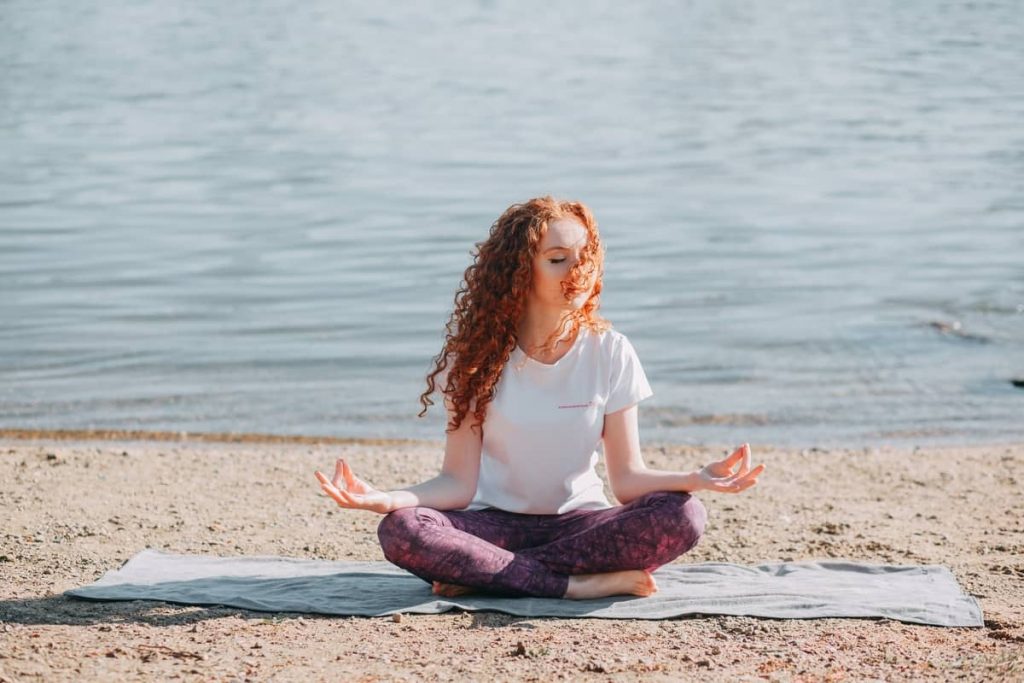
By understanding the domains of recreational therapy one thing is clear it improves the cognitive, physical, emotional, spiritual, and social life of an individual. But that’s not it! There are a lot of other benefits that recreational therapy has to offer, this includes:
1. Support in patient’s recovery: when you begin with recreational therapy, all your health concerns are examined and a recovery plan is created accordingly. It acts like a supportive treatment for the existing medical treatment you’ve been going through.
2. Improved quality of life: According to a 2014 research, it was proved that engaging in recreational activities can improve your cognitive abilities and overall health. When you regularly engage in recreational activities you’re most likely to feel a lot of joy and happiness. Recreational therapy helps you find joy in tiny things and improves the overall quality of life.
3. Increased cooperation: when you are engaging in recreational activities with other people you learn quite a few things. You learn to put others’ needs before yours or cooperate with your group for a collective purpose, etc.
4. Healthy eating and sleeping pattern: the best part about recreational therapy is that it helps you use most of your energy doing things you enjoy. Therefore, your eating habits and sleep patterns improve when your energy is used properly. A 2017 study stated that engaging in physical activities and social interactions can improve the functioning of your brain.
5. Improved attention span: when you have ten and more things in your mind and a million emotions to deal with, your attention span drops. However, with recreational therapy, you deal with your emotions and let them out of you.
6. Better perception of self (+body image): when you are working on things that you really enjoy and activities that don’t put any pressure on you, you get enough time to introspect. Your perception of yourself improves and you understand and respect yourself more.
7. Better communication skills: a 2018 study focusing on older adults revealed that recreational activities benefited them as they improved their social skills and self-esteem. As and when you engage in more and more recreational therapy activities, you work with a lot of people with allows you to improve your communication skills.
8. Stronger immune system: our immune system drops when we don’t feel good emotionally, mentally, or physically. Recreational therapy helps us improve our overall well-being automatically improving our immune system.
9. Reduced symptoms of depression, stress, and anxiety: recreational therapy use leisure activities to boost your mood and help you exercise your brain. These exercises motivate you to adopt a positive attitude toward life. A 2018 study found that engaging in physical recreational activities can reduce symptoms of mental health conditions like depression.
Best Recreation Therapy Activities for Mental health
Recreational therapy activities will vary for each individual, depending on his needs, Some of the common activities that this program provides are creative arts, drama, music, games, yoga, exercise, meditation, connecting with nature, solving puzzles, playing trivia games, enhancing the senses, gardening, community work, and sports to name a few.
How Can I Find A Recreational Therapist?
Since recreational therapy is used to improve your skills, abilities, emotional health, etc using leisure activities. Now, when you or a loved one is already in a hospital facility, getting treated for your condition, you won’t need to find a recreational therapist. Most hospital facilities have recreational therapists.
You can find an independent recreational therapist as well. You can simply do a web search or enquire with people who have been in touch with recreational therapists.
However, if you are looking for a recreational therapist on your own, there are a few questions you need to ask yourself before you choose the right therapist;
- Are your recreational therapy services covered in your insurance policy?
- Is your recreational therapist a certified practitioner or not?
- Is your therapist willing to consider your abilities and interests while creating a plan for you?
- Is your therapist helping you achieve what you want?
- Is your recreational therapist actively listening to your ideas?
- Is your therapist respectful of your feelings and emotions?
- Is your therapist aware of your culture and response well to it?
Finding a recreational therapist might not be that hard but finding a good one can be tricky. You need to be clear about what you are looking for in a therapist and what you want to achieve through recreational therapy.
Recreational therapists are usually employed in hospital facilities, adult care centers, rehabilitation centers, substance abuse centers, community health care centers, correctional facilities, schools, etc.
Recreational Therapy and FAQs
Q1. Where do recreational therapists work?
You are likely to come across a recreational therapist in multiple settings like hospitals, schools, sports programs, community centers, substance use programs, institutions, nursing homes, recreation departments, government parks, and more. They usually work full time and are certified, therapeutic recreation specialists.
Q2. What do recreational therapists do?
Recreational therapists will work towards planning, directing, and formulating recreation-based programs for people with physical or mental health conditions. By finding the right therapist, the well-trained one, you can also boost your confidence, memory, physical fitness, reasoning abilities, creativity, and mood.
Q3. Who can benefit from a recreational therapist?
Recreational therapy welcomes people of all ages, be it an infant or an elderly person. If your aim is to experience positive health and enjoy a sense of overall well-being, this is the therapy for you! Not just that, people with developmental issues, mental health conditions, or physical injuries can also alter their living conditions with this therapy.
Q4. Is recreational therapy like “fun time” alone?
We often relate leisure activities with fun, games, and enjoyment, However, when we talk of recreational therapy it does a purpose beyond that. The aim here is to design a specific program for each client that meets their needs by adding activities that have a purpose behind them.
The designing is done such that apart from offering relief in signs experienced it also enhances the overall quality of life. To conclude we can say that therapeutic recreation is not just fun and play, but a channel to harness your power to play in something bigger.
Final Words:
We hope that now you are pumped up to begin your journey of holistic wellness by looking at this amazing therapeutic process called recreational therapy. Remember, WHO does not define health as the mere absence of disease.
Health is in fact defined as a state of complete physical, mental, and social well-being. And now you know your one-stop destination for the same. So, go achieve your goal of a healthy life now.
Thank you for reading!
Love & Light
Next Read:
What Is Psychodynamic Therapy | Approaches, Uses And Key Concepts
What is Filial Therapy: Techniques and Benefits
Person-Centered Therapy: How it Functions and What You Should Expect






